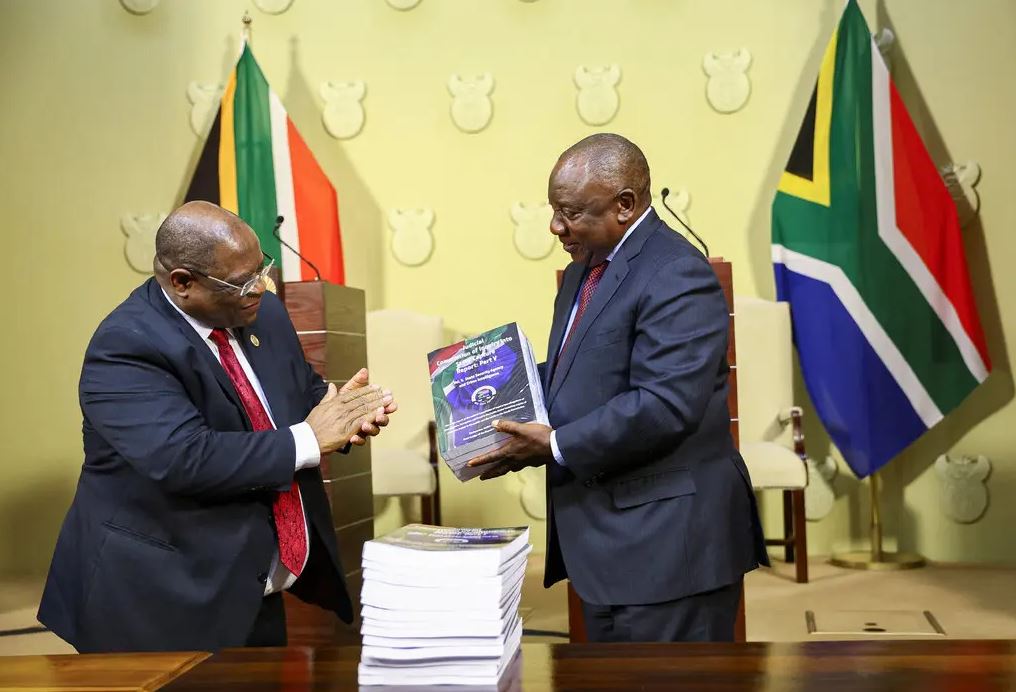On Wednesday, the concluding findings of a three-year investigation into systemic corruption in South Africa were made public. The findings were included in a roughly 5,000-page report that heavily implicated the country’s former president, Jacob Zuma, but also found fault with how the country’s current president, Cyril Ramaphosa, handled allegations of misconduct.
Raymond Zondo, the chief justice of South Africa and the person in charge of the judicial panel, presented Cyril Ramaphosa with the final report of the commission’s conclusions at a televised ceremony on Wednesday evening. The report was bound in the colours of the South African flag. It was the sixth report that had been issued since January as part of the investigation into “state capture.” State capture refers to the pervasive corruption of public officials and businesses that has led to South Africa’s ongoing economic and political difficulties.
The results give Mr. Zuma a significant amount of attention. In 2016, a report by a constitutional watchdog known as the public protector investigated his relationship with the Gupta brothers, who are Indian-born businessmen who wielded such power that they were able to handpick cabinet ministers. The report found that he had a conflict of interest with the Gupta brothers. In reaction to the original report, Mr. Zuma initiated the investigation that would be carried out by the judicial panel, but when he lost political power, the commission contributed to his collapse. A year ago, he was arrested on accusations of contempt of court because he refused to testify before the commission. A number of well-known personalities from the political sphere, including Mr. Ramaphosa, testified in front of the panel.
During Mr. Zuma’s administration, the Gupta brothers amassed an enormous fortune by profiting from lucrative state contracts in a variety of businesses, ranging from mining to the media. This month, the Gupta brothers were detained in Dubai. According to earlier parts of the study, this resulted in the privatisation of formerly state-owned businesses, such as the national power provider and the national rail company, which contributed to the enterprises’ subsequent decline.
According to the latest report, the family milked the South African Broadcasting Corporation for money and influence by using their media company and their proximity to public officials to do so. The guests who were flying in for the wedding were greeted at an important military air base by the family. According to the article, Mr. Zuma’s son became a middleman between the Guptas and the government. According to the findings of the research, other high-ranking government figures performed the brothers’ bidding as well, frequently at the cost of the underprivileged citizens of the nation.
According to the research, the strong connection that the Gupta family maintained with Mr. Zuma was the primary factor responsible for their influence. It was believed that Mr. Zuma’s other associates had utilised important institutions, such as the state security agency, to conduct political conflicts between different factions.
However, any reform would be gradual since the national prosecution authority was also damaged by corruption. This will make any change difficult to implement. According to Mr. Gumede, it is quite possible that it will be further delayed by infighting inside the African National Congress as the organisation deals with the impact of the study.
At this time, Mr. Ramaphosa is the subject of his own investigation into allegations of wrongdoing. There have been doubts raised about a break-in that occurred at his property in 2020 but was never reported. A political adversary of Mr. Ramaphosa and a supporter of Mr. Zuma accused him of concealing up the theft of between $4 million and $8 million in United States currency so as to escape attention over having significant quantities of cash stashed away. This same ally, the former head of state security Arthur Fraser, was also named in the report as a person who engaged in corrupt activity.
Mr. Ramaphosa ran his campaign on the platform of revitalization, both for the incumbent African National Congress (ANC) and for the nation of South Africa as a whole. The study said that Mr. Ramaphosa and the ANC were complicit in the spread of bribery due to their lackadaisical attitude toward the issue of corruption and their poor response time.
According to the findings of the report, as scandals unfolded, the party not only disregarded calls from long-standing members to take action against corruption, but it also disregarded some of its own internal checks and balances to deal with corruption, doing little more than issuing statements to the media. When it did try to act — for example, when the party attempted to hold Mr. Zuma responsible for his ties with the Gupta brothers — the A.N.C.’s own focus on unity hampered its capacity to do so.
The study raised questions about whether or not Mr. Ramaphosa, in his role as Mr. Zuma’s deputy inside the party and in the government, knew enough to curb corruption and whether or not he did enough to stop it. The investigation called into doubt his statement that he had just learnt about the scope of the corruption along with the rest of the general public, referring to public charges that dated all the way back to 2010 against Mr. Zuma and the Gupta brothers.

